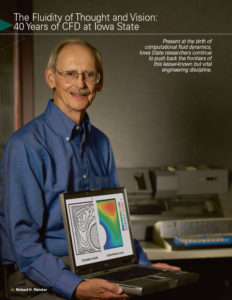
Iowa State University has a history of excellence in multiphase flows. Professor Art Bergles (ME chair 1972-1983) had a large experimental program in boiling and two-phase flows; a region in Black Engineering was designated for the study of large vertical two-phase flows when the building was first occupied in 1985. Currently, there are several faculty working in the area of experimental multiphase flows over a variety of scales.
On the experimental side, Ted Heindel established the Experimental Multiphase Flow Laboratory in 2000 in the space originally occupied by Art Bergeles, and with support from the National Science Foundation he developed an X-ray flow visualization facility for large-scale multiphase flows. The addition of several faculty from various College of Engineering departments has expanded the experimental capabilities to address multiphase flows from slow- to high-speed, including reacting and non-reacting flows; this includes unique high-speed flow visualization and laser diagnostic capabilities in several multiphase flow areas, as well as an icing wind tunnel.
The strong focus in multiphase flow computational methods also had its start in the 1970s. Dick Pletcher (Mechanical Engineering) and Dale Anderson and John Tannehill (Aerospace Engineering) founded a computational fluid dynamics (CFD) Center that fostered several fruitful interactions.
This activity has evolved into an expertise in multiphase flow science including gas-solid, solid-liquid, bubble- and droplet-laden flows. Starting in 2002, Rodney Fox and Shankar Subramaniam led a program on kinetic theory of gas-solid flow initiated by Dr. David Hoffman at the US DOE Ames Laboratory. The Granular and Multiphase Systems (GAMS) working group grew out of that effort and began meeting regularly to collaborate on multiphase flow research. With time the group has grown considerably and expanded its collaborative efforts to encompass Aerospace and Civil, Construction, and Environmental Engineering in addition to the Mechanical and Chemical and Biological Engineering departments.
The Center for Multiphase Flow Research and Education (CoMFRE) was established as a research initiative in 2014 with the assistance of the Engineering Research Institute’s Accelerating Collaboration in Research Initiative (ACRI), and was established as a formal research center in December 2017. CoMFRE provides a unique opportunity for the integration of research, education, and outreach activities to accelerate knowledge transfer from fundamental scientific advances in multiphase flow to industrial applications and end-users, representing the logical next phase in multiphase flow research in the College of Engineering.